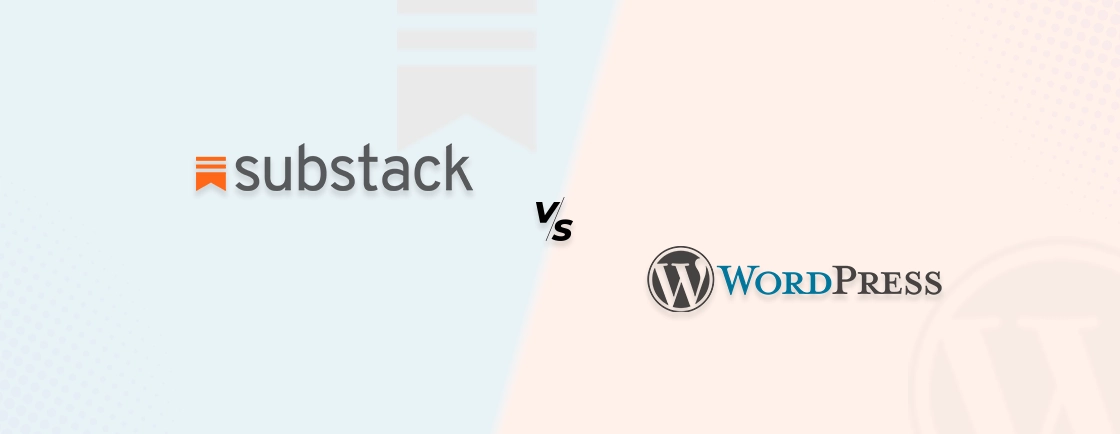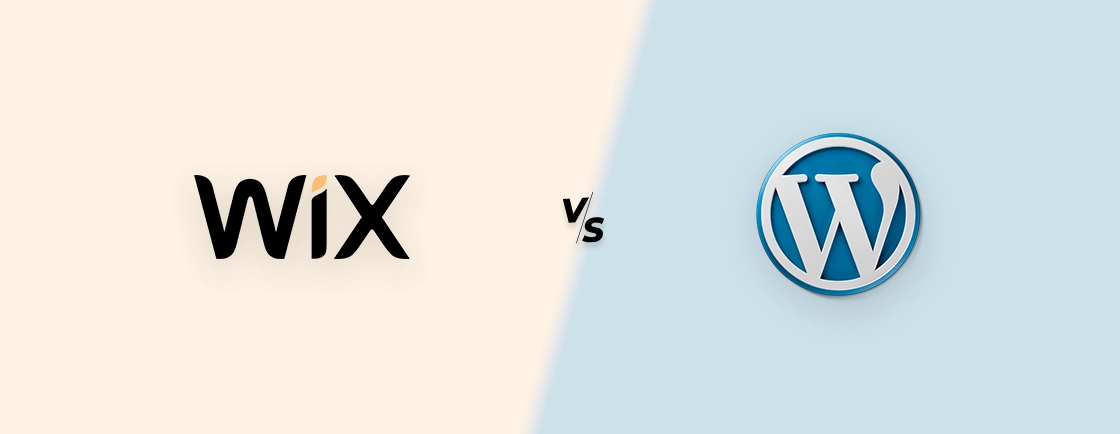Quick Summary
When comparing WordPress vs Laravel, the better choice often comes down to what your priorities are. WordPress is perfect for cost-effective and content-driven sites, while Laravel is built for developers who need custom, scalable, and secure web applications. This blog provides an in-depth comparison covering pros, cons, performance, SEO, eCommerce, and more, so you can confidently choose the right platform for your project.
Table of Contents
When planning a website, the debate of WordPress vs Laravel often comes up. Both are strong options, but they serve different purposes. WordPress is perfect for quick, easy-to-manage websites, even if you’re not an expert. Laravel, on the other hand, is a developer-focused framework that offers full control and flexibility for custom web applications.
In this blog, we’ll compare both based on different parameters. We’ll see the key difference between Laravel and WordPress, along with pros, and cons of each. We will help you understand which platform is the smarter pick for your website goals, whether you need speed, simplicity, or complete customization. So, let’s dive in!
WordPress vs Laravel: Understanding the Fundamentals
When comparing WordPress vs Laravel, the fundamentals come down to how they are built and used. WordPress is designed for speed and simplicity. It follows a plug-and-play approach, letting you set up a website quickly. Laravel, in contrast, is built for flexibility and control. It gives developers the tools to create custom features and structure websites exactly how they want.
Another key difference is scalability. WordPress works well for small to medium websites. Laravel shines for larger, complex projects where performance and customization matter. Security is also approached differently. WordPress relies on plugins and updates, while Laravel lets developers implement security at a deeper level.
Understanding these fundamentals helps you see which platform aligns with your goals, budget, and long-term plans.
What is WordPress?

Launched in May 2003, WordPress is a powerful and flexible content management system (CMS). That’s why it has become the foundation for millions of websites worldwide. At its core, it’s a tool that makes it easy to create, manage, and publish content online without needing to write complex code.
Originally designed as a blogging platform, WordPress has evolved into a versatile platform. It’s capable of handling everything from personal blogs and online stores to corporate websites and complex web applications.
Pros & Cons Of WordPress
Let’s take a look at the pros and cons of WordPress
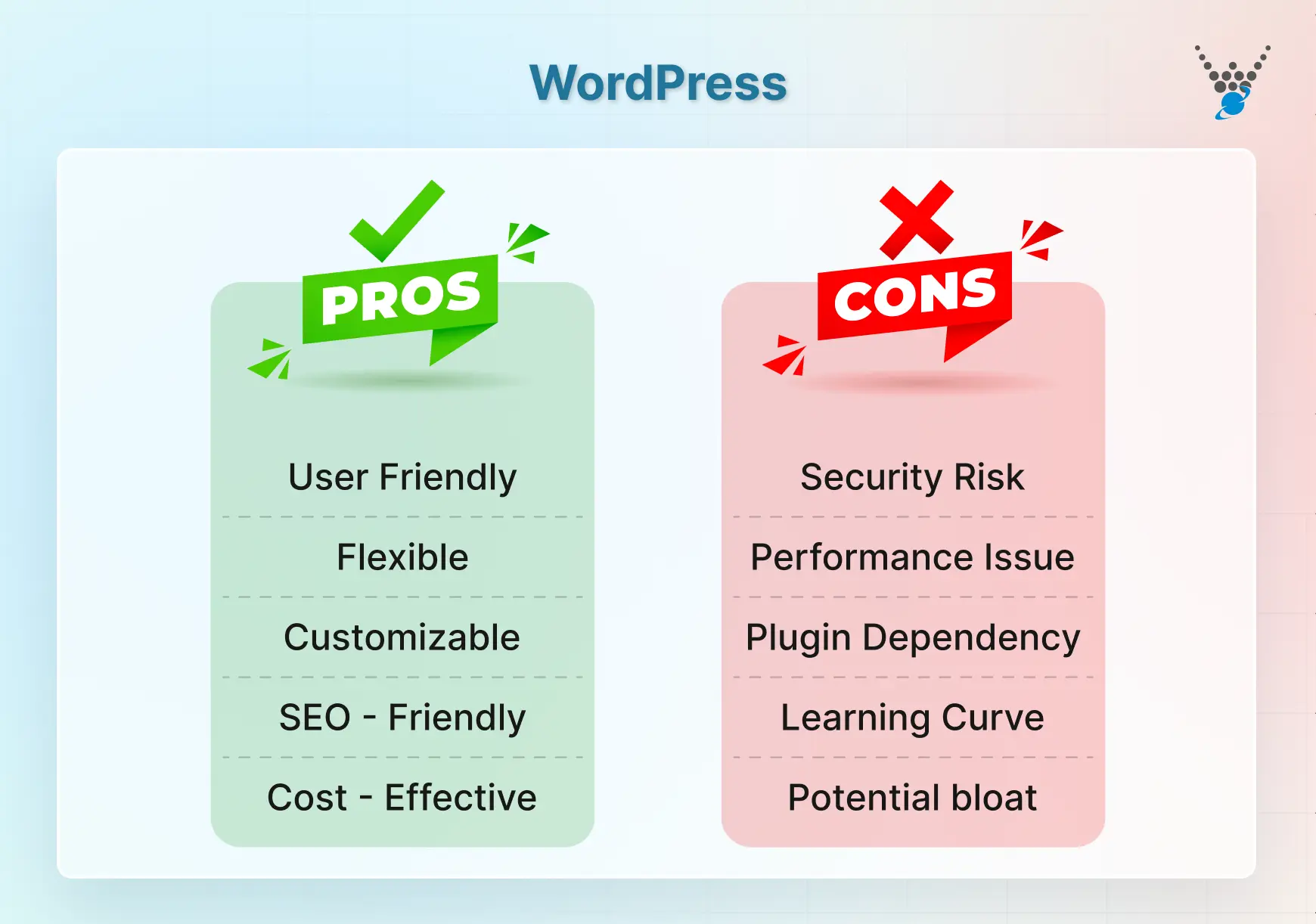
Pros of WordPress
- User-friendly: Easy to learn and use, even for beginners.
- Flexibility: Can be used for a wide range of websites, from blogs to e-commerce stores.
- Customization: Extensive library of themes and plugins for tailored designs and functionalities.
- SEO-friendly: Built with search engine optimization in mind.
- Large community: Strong support network and resources available.
- Cost-effective: Free to use, with affordable hosting options.
Cons of WordPress
- Security: Requires regular updates and security measures to protect against vulnerabilities.
- Performance: Can become slow with too many plugins or low-quality hosting.
- Dependency: Relies on plugins for many features, which can introduce compatibility issues.
- Learning curve: Advanced customization may require some coding knowledge.
- Bloat: Can become bloated with unnecessary features if not managed carefully.
Though there are some cons of using WordPress for your website, when you look at the big picture, your website will benefit from this CMS.
If you want to leverage the pros and handle the cons in the best way possible, opt for our WordPress development services.
What is Laravel?

Released in June 2011, Laravel is an open-source platform used to create web applications using its wide array of syntaxes. It offers a robust architecture and includes an extensive collection of tools to ease the development process.
The latest version of Laravel includes new features like localization, views, routing, authentication, models, and sessions, along with the Blade template engine and inversion of control.
Then there are updated features like integrated database management system support, packaging mechanism known as bundles, command line interface called artisan, and support for managing events.
Pros & Cons Of Laravel
Let’s look at the pros and cons of Laravel.
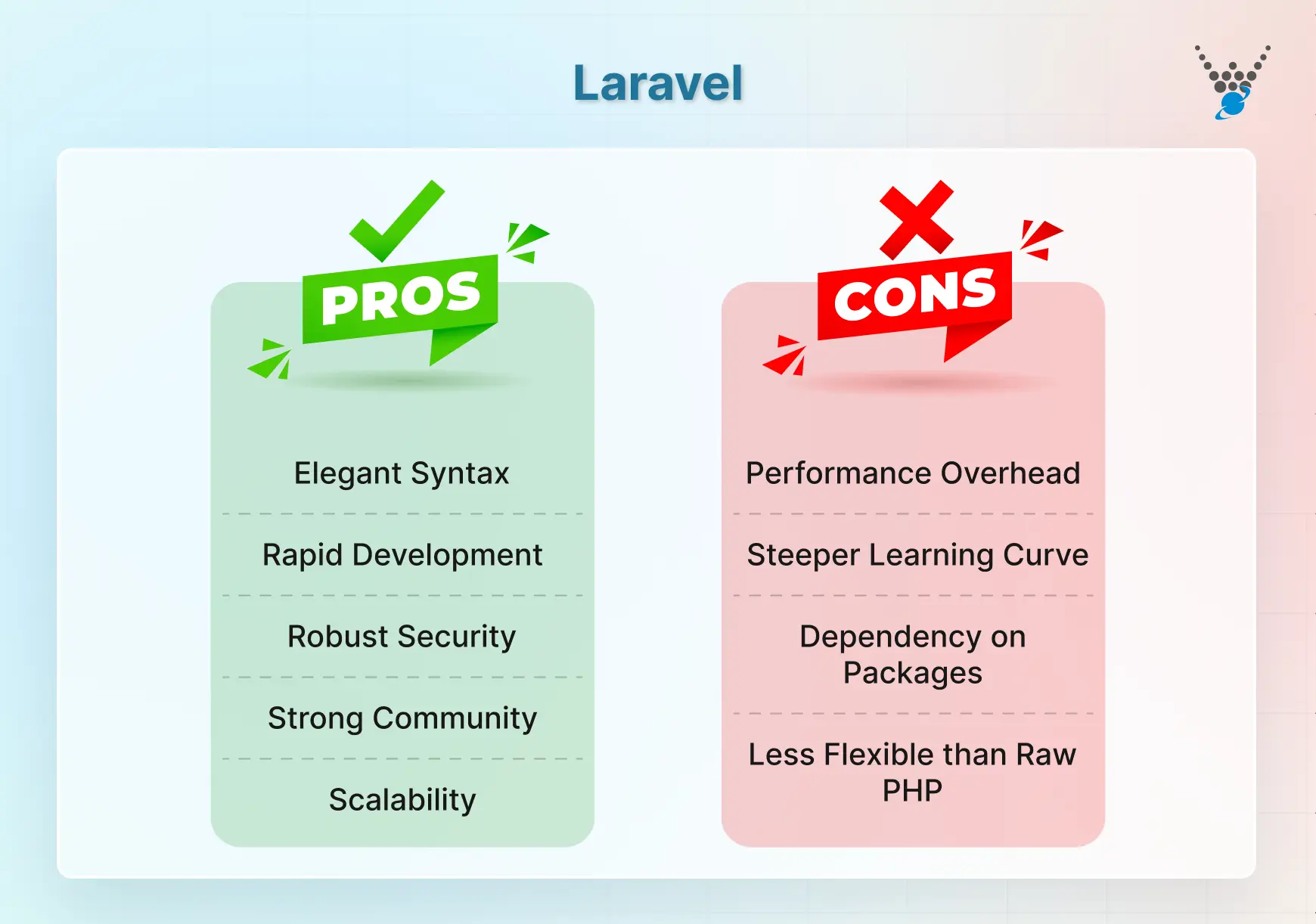
Pros of Laravel
- Elegant Syntax: Laravel’s syntax is clean and expressive, making it easier to read and write code.
- Rapid Development: Built-in features and tools accelerate development time.
- Robust Security: Includes various security features to protect applications.
- Strong Community: A large and active community provides support and resources.
- Scalability: Can handle small to large-scale applications.
- MVC Architecture: Promotes code organization and maintainability.
- Eloquent ORM: Simplifies database interactions.
- Artisan CLI: Offers a powerful command-line interface for automation.
Cons of Laravel
- Performance Overhead: Compared to raw PHP, Laravel can have some performance overhead, although optimizations can mitigate this.
- Steeper Learning Curve: While Laravel is beginner-friendly, mastering its features requires more time than some other frameworks.
- Dependency on Packages: Some functionalities might rely on third-party packages, which could introduce vulnerabilities or compatibility issues.
- Less Flexible Than Raw PHP: Laravel provides structure, but it can limit flexibility compared to raw PHP for complex scenarios.
Want to leverage the pros and handle the cons of Laravel? Consider our Laravel development services for your project.
Comparison Table of WordPress vs Laravel
WordPress is a good choice for building simple and straightforward websites, while Laravel is best-suitable for building complex and custom web applications. Let’s have a look at a quick comparison between WordPress vs Laravel.
| WordPress | Laravel | |
|---|---|---|
| Launch Year | May 2003 | June 2011 |
| License | GNU (General Public License) | MIT License |
| Creator | Mike Little & Matt Mullenweg | Taylor Otwell |
| Written in | PHP | PHP |
| Current version | 6.8.2 | 12 |
| Server Requirements | Web Server: Apache with mod_rewrite or NginxPHP: Version 8.3 or higherDatabase:MySQL 8.0 or higherMariaDB 10.6 or higherRAM: At least 512 MB (1 GB recommended for optimal performance)CPU: At least 1.0 GHzDisk Space: At least 1 GBHTTPS Support: SSL certificate enabled | PHP Version: ≥ 8.1 (8.2+ recommended for best performance)Required PHP Extensions: BCMath, Ctype, Fileinfo, JSON, Mbstring, OpenSSL, PDO, Tokenizer, XML, PCRE, GD or Imagick (needed if using image processing)Database Support (project-dependent):MySQL ≥ 8.0PostgreSQL ≥ 13SQLite ≥ 3.35SQL Server ≥ 2019Optional but Recommended: Redis (for caching and queues), Sodium (for encryption, bundled with PHP ≥ 7.2), Composer 2+ |
| Cost-effectiveness | WordPress is free to use as default, and there are several free plugins to improve the website’s appearance and functionality. | It may be harder to create a website through Laravel. So you’ll need expert developers driving the development costs high. |
| Scalability | It can help create scalable websites. | It can also help create scalable websites. |
| Architecture | It has features like plugin architecture. | It is based on the Model View Controller architecture. |
| Authentication | Authentication in WordPress is taken care of by the plugins. | Laravel has authentication, authorization, inversion of control, etc. Every release improves authentication. |
| Database System | MySQL | MySQL, Postgres, SQLite, and SQL |
| Features | -Simplicity-Flexibility-Easy publishing-Advanced publishing tools-Media management-User management-Easy theme system | -Support multi-user system ORM on Eloquent Low installation capacity HTML-Blade templating -Multilingual support REST API compatibility |
| Learning Curve | WordPress has a steep learning curve, but its simple publishing features and scalability make it a formidable contender in the long run. | Laravel has a steep learning curve, but with Laracasts and strong documentation, you can learn the framework and PHP quickly. |
| GitHub Star Ratings | 56,504 stars | 79,097 stars |
What are the Similarities Between Laravel and WordPress?
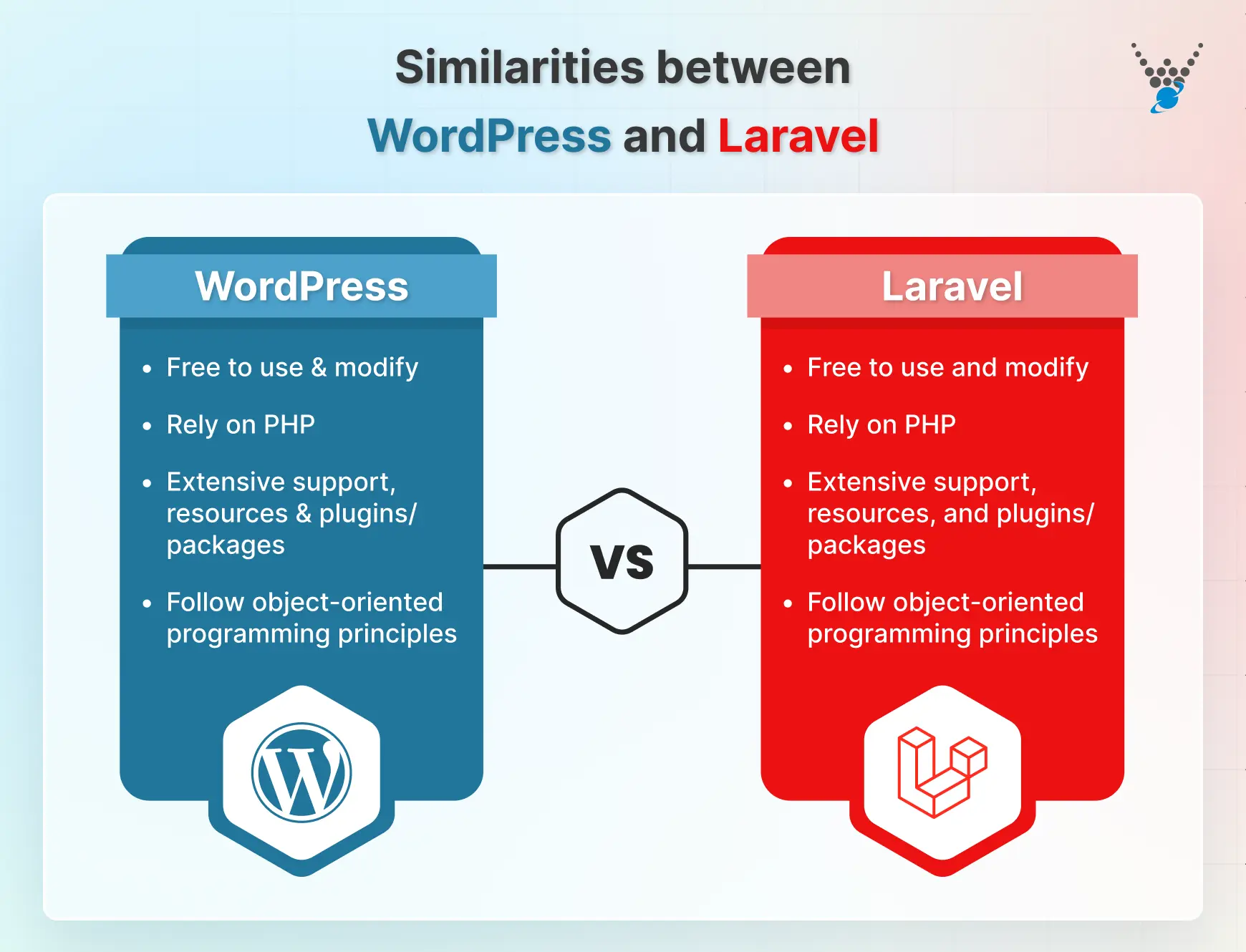
Both Laravel and WordPress can help you create well-defined, good-looking, functional websites. They can help you ensure user-friendliness and easy management of the admin panels. There are other similarities between the two, including:
- Open-source: Both platforms are open-source, meaning they are free to use and modify.
- PHP-based: Both rely on PHP as their primary programming language.
- Large Communities: Both have extensive and active communities of developers and users, offering support, resources, and plugins/packages.
- Customization: Both platforms offer high levels of customization, although the approaches differ. WordPress relies heavily on themes and plugins, while Laravel provides more granular control through code.
- Flexibility: Both can be used to create a wide range of websites and applications, although WordPress is generally better suited for content-focused sites, while Laravel excels in complex web applications.
- Object-oriented Structure: Both platforms follow object-oriented programming principles.
It’s important to note that while they share some similarities, their core functionalities and target audiences are distinct. WordPress is one of the best content management systems, while Laravel is a web application framework.
Differences Between Laravel and WordPress
With more than 43% of websites, WordPress is the most popular content management system. However, Laravel is a rapidly evolving web development platform that offers some excellent features.
Let’s check out the differences between WordPress and Laravel on the following factors:
Usage Statistics

More than 43% or 835 million websites on the internet are powered by WordPress. Moreover, of all the websites that use content management systems, WordPress is used by over 63% of websites, making it the most popular CMS. In fact, WordPress usage has increased by roughly 12% every year for the past ten years or so. More than 1.1 million new domains are registered on WordPress every 6 months.
Although more than 1.6 million websites have used Laravel, there are currently around 752K live websites using Laravel. Laravel has a total of 96,243 unique domains. USA uses Laravel the most across the globe around 14,299 websites are made with its help of it.
Verdict: Looking at the statistics, it’s clear that WordPress is the winner.
Speed

WordPress, while offering immense flexibility, can often suffer from performance issues. This is primarily due to:
- Plugin bloat: An excessive number of plugins can slow down a website significantly.
- Theme complexity: Overly complex themes can impact loading times.
- Image optimization: Large, unoptimized images can significantly slow down page load times.
- Hosting quality: A subpar hosting environment can negatively affect performance.
However, it’s important to note that these issues can be mitigated with careful optimization. Techniques such as site caching, image optimization, and choosing the best themes can dramatically improve WordPress speed.
On the other hand, Laravel is generally recognized for its superior performance compared to WordPress. This is due to:
- Architecture: Laravel’s architecture is designed with performance in mind.
- Caching: Built-in caching mechanisms help to optimize request handling.
- Flexibility: Developers have more control over code optimization and can implement performance enhancements directly.
Verdict: Laravel typically outperforms WordPress in terms of raw speed. However, a well-optimized WordPress site can deliver acceptable performance for most users.
Security

WordPress, due to its popularity and open-source nature, is a prime target for hackers. While the core platform has improved security measures over the years, its reliance on third-party plugins and themes can introduce vulnerabilities.
- Plugin vulnerabilities: Not all plugins are created equal, and some may have security loopholes.
- Theme vulnerabilities: Similar to plugins, themes can introduce security risks.
- User error: Weak passwords, outdated software, and poor security practices can compromise a WordPress site.
That said, WordPress has a strong community that constantly monitors for vulnerabilities, and the platform itself receives regular security updates.
Laravel, on the other hand, is generally considered more secure than WordPress due to its architectural design and focus on security best practices.
- Built-in security features: Laravel includes features like CSRF protection, SQL injection prevention, and encrypted password storage.
- Developer control: Developers have more control over security measures, allowing for custom implementations.
- Smaller attack surface: Compared to WordPress, Laravel typically has a smaller attack surface due to its nature as a framework.
Verdict: Laravel generally offers a higher level of security out-of-the-box compared to WordPress. However, both platforms require ongoing attention to security best practices to protect against threats.
CMS

WordPress is a Content Management System (CMS) at its core. It’s designed to manage content efficiently, with features like post editing, categorization, and media management built-in.
The intuitive interface makes it easy for users with minimal technical knowledge to create and manage content. A vast array of plugins extends WordPress’ CMS capabilities, offering specialized features for blogging, e-commerce, and more.
On the contrary, Laravel is a PHP framework, not a CMS. While it can be used to build a CMS, it requires significant development effort.
To create a CMS using Laravel, experts build features like content management, user roles, and permissions from scratch. This approach offers maximum customization but demands more technical expertise.
Verdict: WordPress is the clear winner in terms of a built-in CMS. It’s designed specifically for content management and offers a user-friendly experience.
Search Engine Optimization

WordPress has a strong reputation for being SEO-friendly. It offers several advantages. Some of the best built-in features of WordPress are meta tag customizations and permalink structuring. Plus, there are plugins like Yoast SEO and Rank Math provide advanced SEO tools and optimization recommendations.
A vast community of users and developers constantly refine SEO best practices for WordPress.
On the other hand, while Laravel doesn’t have built-in SEO features like WordPress, it offers greater flexibility for advanced SEO implementation. Laravel developers can tailor SEO elements precisely to match their target keywords and audience.
Laravel’s focus on performance can indirectly benefit SEO, as faster websites tend to rank higher. Plus, implementing rich snippets can be more straightforward in Laravel due to its flexibility.
Verdict: WordPress is one of the best choices for SEO. That is, thanks to its plugins and user-friendly interface. But you might get more control over the website optimization with Laravel.
eCommerce

WordPress has become a popular choice for online stores thanks to its user-friendliness and a vast ecosystem of eCommerce plugins. The most popular WordPress plugin for building eCommerce websites is WooCommerce. It offers a wide range of features, flexibility, and scalability.
For those without extensive technical knowledge, WooCommerce provides a relatively easy setup process. A strong community ensures continuous development and support for WooCommerce.
On the other hand, Laravel doesn’t offer a built-in eCommerce solution. But it provides the foundation for creating highly customized online stores. Developers have complete control over the eCommerce platform, allowing for tailored solutions.
Laravel’s architecture can lead to faster and more scalable online stores. Furthermore, complex features like inventory management, order processing, and payment gateways can be implemented with precision.
Verdict: WordPress, with WooCommerce, is the easier and faster option for most businesses looking to set up an online store. It offers a solid foundation and a vast array of features. But Laravel might help develop a more customized eStore. The development, though, will be more technically involved. Plugins & Extensions
Plugins & Extensions

WordPress boasts an extensive plugin library, offering a vast array of functionalities, from SEO to eCommerce and more. You can choose the best plugins and have them installed with a few clicks. That makes it easier to extend WordPress functionality.
With a large community, you get continuous updates and reliable support for popular plugins. And if you need something tailored, our WordPress plugin development services can create custom solutions just for you.
Laravel, on the flip side, uses packages to extend its functionality. These packages are typically more focused and higher quality than many WordPress plugins. It uses Composer, one of the key web development tools, to manage packages, ensuring compatibility and security.
The best Laravel packages tend to be more optimized for performance compared to some WordPress plugins.
But, of course, Laravel’s package ecosystem isn’t as extensive as WordPress’ plugins. But it offers a more controlled and often higher-quality approach to extending functionality.
Verdict: WordPress wins in terms of sheer quantity and ease of use for plugins. However, Laravel’s package-based approach often provides better quality, performance, and security.
What to Choose Between Laravel and WordPress?

The decision to use Laravel or WordPress largely depends on the nature of your project.
WordPress and Laravel are both excellent for designing and developing websites. Both have their pros and cons. But your choice should primarily depend on your requirements and expectations from the website.
When to Choose WordPress?
- Content-focused websites: Blogs, personal websites, and portfolios.
- eCommerce stores: With plugins like WooCommerce, WordPress offers a robust eCommerce solution.
- Limited budget: WordPress is often more cost-effective due to its user-friendly nature and extensive plugin ecosystem.
- No coding experience: WordPress is more accessible to those without coding knowledge.
When to Choose Laravel?
- Complex web applications: Enterprise-level applications, social networks, or custom software.
- High performance requirements: Laravel’s architecture often leads to faster applications.
- Scalability: For projects that need to handle increasing traffic and data.
- Full control over development: Laravel offers complete flexibility for custom features.
In some cases, a hybrid approach, i.e. integrating WordPress into Laravel, can be beneficial. That means, using Laravel for the backend API and WordPress for the frontend. But it will be a bit complex. So I suggest you consult with our professional web development company. We will ensure the best solution according to your requirements.
Is it Possible to Combine WordPress and Laravel?

Simply put, yes, you can use WordPress in conjunction with Laravel. You can easily split your developmental process by using the WordPress administration panel for the back end and Laravel for the front end.
You can go about this hybrid combination through Corcel, a collection of PHP classes. An open-sourced collection can be created alongside the Laravel Eloquent method to help the developers get the data directly from the WordPress database.
If you are someone who uses Laravel but wants to use WordPress for more tricky projects, the WordPress-Laravel hybrid would be the day to go.
Related Blogs You Shouldn’t Miss:
WordPress Vs Drupal
WordPress Vs Static HTML
Medium Vs WordPress
Final Thoughts on Laravel vs WordPress for 2025
The decision between WordPress vs Laravel comes down to objectives, project goals, level of expertise, and vision. WordPress is a leading CMS with an easy dashboard, rich themes, and plugins that let anyone build professional sites without much technical skill. It’s perfect for bloggers, entrepreneurs, and small businesses looking to launch quickly.
Laravel, on the other hand, is a PHP framework built for custom web apps, offering scalability and flexibility for complex features, unique workflows, or enterprise-level solutions. When making your decision, consider your project needs and growth plans.If simplicity, speed, and cost-effectiveness are priorities, WordPress is a strong choice. If you require advanced customization and long-term scalability, Laravel may be the better fit. Either way, you can hire professional web developers to help you get the best out of both platforms.
FAQs on Laravel vs WordPress
Can Laravel replace WordPress?
Not really. Laravel and WordPress serve different purposes. WordPress is a CMS designed for quick and easy website building, while Laravel is a framework for creating fully custom applications. If you need speed and simplicity, WordPress is better. If you need complex features and full control, Laravel is the right choice.
Which is more beginner-friendly, Laravel or WordPress?
WordPress is far more beginner-friendly. You don’t need coding knowledge to set up a site, thanks to its themes and plugins. Laravel, however, requires solid programming skills. It’s powerful but meant for developers, not beginners.
Is WordPress good for large-scale websites?
WordPress can handle large websites, but it has limits. With the right hosting, plugins, and optimization, it works well for content-heavy sites. However, for enterprise-level projects with complex workflows, Laravel or other custom solutions may be a better fit.
Which is more secure, Laravel or WordPress?
Laravel generally offers stronger security because developers can build protection directly into the code. WordPress is secure too, but it depends heavily on plugins and frequent updates. If not managed properly, it can be more vulnerable.
Compare the best tech side by side.
Our in-depth comparisons help you see features, pros & cons, and choose the right tools confidently.




